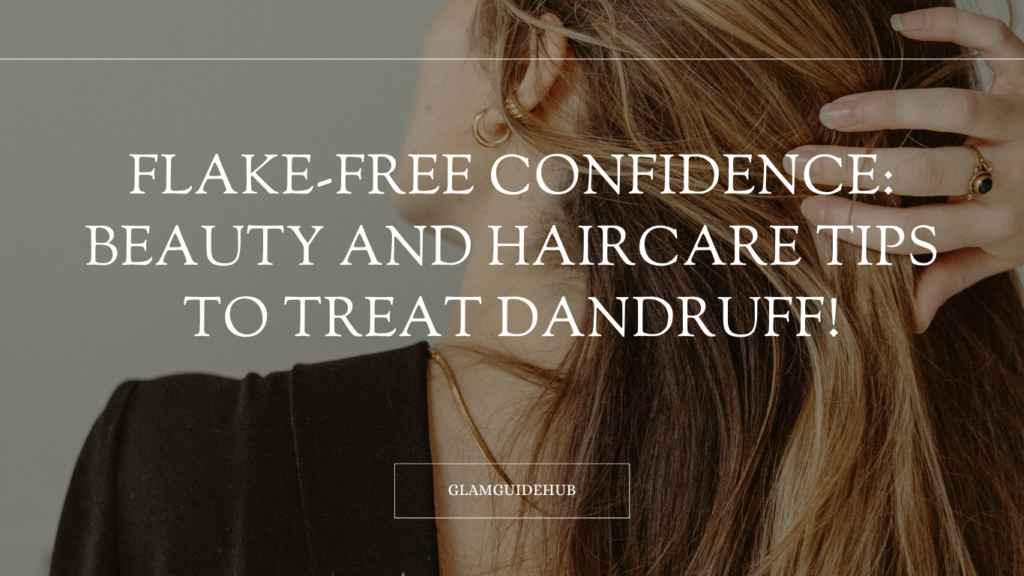
Flake-Free Confidence, Dealing with the pesky snowfall on your shoulders? Say goodbye to dandruff drama with our beauty and skincare tips that’ll have you rocking your hair with confidence. Dandruff is a typical scalp condition that influences a great many individuals around the world. Characterized by the shedding of dead skin cells from the scalp, dandruff can be both embarrassing and uncomfortable. In this article, we will explore the causes of dandruff, its impact on confidence, and effective beauty and haircare tips to treat and prevent it.
Introduction to Flake-free Dandruff:
Dandruff is a chronic scalp condition that results in flaky, itchy skin on the scalp. While it is not contagious or harmful, it can be persistent and difficult to manage. The exact cause of dandruff is still unknown, but factors such as dry scalp, seborrheic dermatitis, and a yeast-like fungus called Malassezia are believed to play a role.
Understanding the Causes of Dandruff:
Dry Scalp:
One of the most common causes of dandruff is a dry scalp. When the skin on the scalp becomes dry and flaky, it can lead to itching and irritation, resulting in the formation of dandruff flakes.
Seborrheic Dermatitis:
Seborrheic dermatitis is a more severe form of dandruff characterized by red, oily skin covered with yellow or white scales. It normally influences region of the body with a high grouping of oil organs like the scalp, face, and chest.
Malassezia:
Malassezia is a yeast-like fungus that lives on the scalp of most adults. However, an overgrowth of Malassezia can lead to irritation and inflammation, causing dandruff to develop.
The Impact of Dandruff on Confidence:
Dandruff can have a significant impact on an individual’s confidence and self-esteem. The visible flakes and constant itching can be embarrassing, leading to feelings of self-consciousness and social withdrawal.
Effective Beauty and Haircare Tips for Treating Dandruff:
Gentle Scalp Care:
Start with a gentle shampoo designed for sensitive scalps. Opt for products with natural ingredients like tea tree oil or aloe vera, known for their soothing and anti-inflammatory properties.
Regular Scalp Massages:
Treat yourself to regular scalp massages to boost blood circulation. This not only feels heavenly but also promotes a healthier scalp, reducing the likelihood of dandruff.
Apple Cider Vinegar Magic:
An ACV rinse can work wonders! Mix equal parts water and apple cider vinegar, apply to your scalp, and let it sit for a few minutes before rinsing. This helps balance the pH level of your scalp and combat dandruff.
Tea Tree Oil Elixir:
Harness the power of tea tree oil – a natural antifungal and antibacterial agent. Add a few drops to your regular shampoo or dilute it with carrier oil for a nourishing scalp treatment.
Aloe Vera Gel:
Aloe vera gel has soothing and moisturizing properties that can help alleviate itching and irritation associated with dandruff. Applying aloe vera gel directly to the scalp and leaving it on for 30 minutes before rinsing can provide relief from dandruff symptoms.
Omega-3 Fatty Acids in Diet:
Consuming foods rich in omega-3 fatty acids, such as fatty fish, flaxseeds, and walnuts, can help improve the health of the scalp and reduce inflammation, thereby reducing the risk of dandruff.
Limit Hot Water Exposure:
Hot water can strip your scalp of essential oils, contributing to dandruff. Opt for lukewarm water when washing your hair to maintain a healthy balance.
Hydration Inside Out:
Stay hydrated! Drinking enough water helps keep your scalp and skin hydrated, reducing the likelihood of dryness and flakiness.
Choose the Right Hair Products:
Check your hair products for harsh chemicals that may exacerbate dandruff. Choose sulfate-free and moisturizing products to keep your scalp happy.
Lifestyle Changes to Combat Dandruff:
Managing Stress Levels:
Stress can exacerbate dandruff symptoms by weakening the immune system and increasing inflammation. Practicing stress-reduction techniques such as meditation, yoga, or deep breathing exercises can help manage dandruff.
Ensuring Sufficient Hydration:
Dehydration can contribute to dry skin and exacerbate dandruff symptoms. Drinking plenty of water throughout the day can help keep the skin hydrated and reduce flakiness.
Balanced Diet and Nutrition:
Eating a balanced diet rich in vitamins, minerals, and antioxidants can help support overall scalp health and reduce the risk of dandruff. Foods such as fruits, vegetables, whole grains and lean proteins are essential for maintaining healthy skin and hair.
Holistic Approaches to Dandruff Treatment:
Herbal Remedies:
Certain herbs such as neem, rosemary, and fenugreek have been traditionally used to treat dandruff due to their antibacterial and antifungal properties. Using herbal hair rinses or applying herbal pastes to the scalp can help alleviate dandruff symptoms.
Ayurvedic Treatments:
Ayurvedic treatments such as shirodhara and shiro abhyanga involve the application of herbal oils and massage techniques to the scalp to balance the doshas and promote scalp health.
Homeopathy:
Homeopathic remedies such as sulfur, graphite, and kali sulphonium are commonly used to treat dandruff by addressing underlying imbalances in the body.
Overcoming Psychological Effects of Dandruff:
In addition to physical symptoms, dandruff can also have psychological effects such as low self-esteem and anxiety. Seeking support from friends, family, or a mental health professional can help individuals cope with the emotional impact of dandruff.
Conclusion:
Wave goodbye to dandruff and hello to a flake-free, fabulous mane! In conclusion, dandruff is a common scalp condition that can affect confidence and self-esteem. By understanding the causes of dandruff and implementing effective beauty and haircare tips, individuals can effectively manage and treat dandruff, restoring confidence and peace of mind.
FAQs:
1. Can stress worsen dandruff?
Yes, stress can weaken the immune system and exacerbate inflammation, leading to an increase in dandruff symptoms.
2. Are there any natural remedies for dandruff?
Yes, natural remedies such as tea tree oil, apple cider vinegar, and aloe vera gel can help alleviate dandruff symptoms.
3. Is dandruff contagious?
No, dandruff isn’t infectious and can’t be spread from one individual to another.
4. How often should I shampoo to control dandruff?
It is recommended to shampoo at least twice a week with a medicated or anti-dandruff shampoo to control dandruff.
5. Can diet affect dandruff?
Yes, a diet rich in omega-3 fatty acids, vitamins, and minerals can help support scalp health and reduce the risk of dandruff.

Pingback: Beauty & Haircare: Flake-Free Confidence -